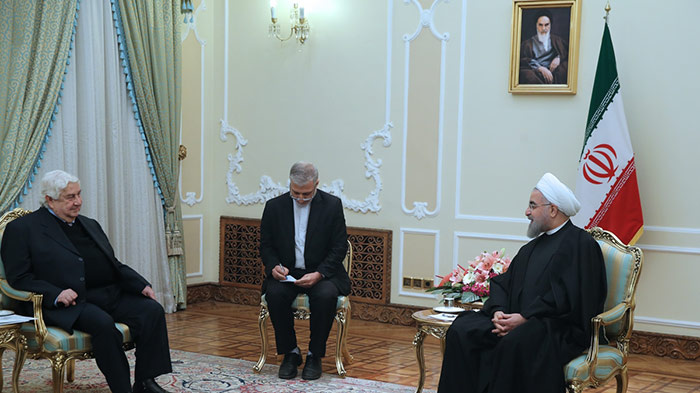The Significance of Walid Muallem’s Recent Tehran Visit

A significant Tehran visit on Saturday made by Syrian Foreign Minister Walid Muallem and head of the National Security Bureau Ali Mamlouk has turned heads.
The high-ranking Syrian delegation’s visit to Tehran was aimed to pursue a number of important issues which may include the nationwide ceasefire, a review of the latest security and field developments in Iran and Syria’s cooperation in battle against terrorism, exchange of opinions about joint political initiatives to protect the ceasefire, preparations for a political solution and continued Syrian-Syrian talks, and measures to prevent terrorist groups from boosting morale and operational capabilities after the defeat in Aleppo.
In Tehran, Walid Muallem had three rounds of intensive talk with his Iranian counterpart Mohammad-Javad Zarif to discuss, among other issues, Damascus’ stance regarding a lasting ceasefire, humanitarian aids, the fight against terrorism, and political initiatives proposed in different negotiations.
In his meeting with Iran’s Secretary of the Supreme National Security Council Ali Shamkhani, Muallem was briefed on Iran’s position regarding the nationwide truce and armed groups’ return to negotiations and yielding to ceasefire conditions after field defeats in Aleppo. Rear Admiral Shamkhani also stressed Iran’s position that any political solution or talks that weakens the Syrian establishment’s rule over the country or put part of the country under the control of terrorist groups or occupation of foreign forces is against the interests of the people, a threat to countries in the region, and doomed to fail.
In a meeting with Walid Muallem and his entourage, President Hassan Rouhani also emphasized that the ground is paved both for field operations against the terrorists and for political activities to restore stability and security in Syria, after the victory in Aleppo. He also expressed hope that future efforts to resolve the Syrian crisis and resume peace talks lead to Damascus’ control over the whole country, security for Syrian people, and protection of the country’s territorial integrity.
Given the abovementioned developments, the significance of the recent visit by the Syrian delegation lies in the following points:
- The visit occurs at a time trilateral talks among Iran, Russia, and Turkey have reached the final phase and parties have presented their approaches. The Syrian officials are up for a meticulous evaluation of the Moscow summit.
- Officials in Damascus have found that Iran and Russia are interested in Turkey’s constructive role in Syria’s developments but do not accept Ankara’s pursuit of previous policies. Tehran and Moscow are trying to create a new atmosphere for cooperation to resolve the Syrian crisis in a new arrangement. Tehran’s Syrian guests were trying to conceive the new model of regional convergence during their visit.
- The Syrian officials seek to properly understand the atmosphere in the trilateral talks in Moscow, which emphasized the beginning of a political process, truce between forces of the Syrian government and non-terrorist opposition groups, as well as international humanitarian aid to be delivered to people in the crisis-stricken parts of Syria. Here, Damascus tries to pave the way for a better implementation of peaceful measures, in order to accelerate the political process.
- At the moment, what matters in the acceleration of the political process in Syria is effort to bring the political opposition to the table in the upcoming summit in Kazakhstan. Given the failed attempts in previous rounds of talks caused by intervention from some regional players, it seems that ways to accelerate the process are being reviewed and evaluated in Tehran.
- Strategic relations between Iran and Syria require extensive talks between the sides in order to reach a roadmap for the days to come, taking into account the capabilities of the players involved in the Syrian crisis. It is because Syria’s legal government will have its own conditions, solutions, and commitments as the main player in the upcoming talks. It is with a precise coordination that one could hope the talks will bear results.
- Ever since Tehran was invited to the international Syria summit held in Lausanne, Iran has played an active role in establishing stability and security in Syria. It is still of significance for Syrian officials as a constructive strategy for the future of political developments in the country.
Despite rumors of Iran’s marginalization in the major Syria developments, including the truce, which assume greater roles for Russia and Turkey, Iran has played a significant role in the ceasefire, in the face of sensitivity on the part of some countries regarding Iran’s key role in the field and political scene in Syria. Proof is that the ceasefire plan Russia brokered in the UN Security Council closely resembled Iran’s four-article plan for peace in Syria.
The coordination between Iran and Russia has been manifest in Syria developments. Before the Security Council approved the Russian-backed resolution, the Iranian and Russian presidents stressed in a phone conversation that Russia’s diplomatic efforts regarding Syria were undertaken in coordination with Iran.
The recent developments, ranging from the trilateral summit, the liberation of Aleppo to the upcoming summit in Kazakhstan and the UN resolution, all indicate coordination at the macro level among the major players in the Syrian crisis. This demonstrate that the developments in Syria are back on a promising and constructive road, led by Russia and Iran, and more recently Turkey.

